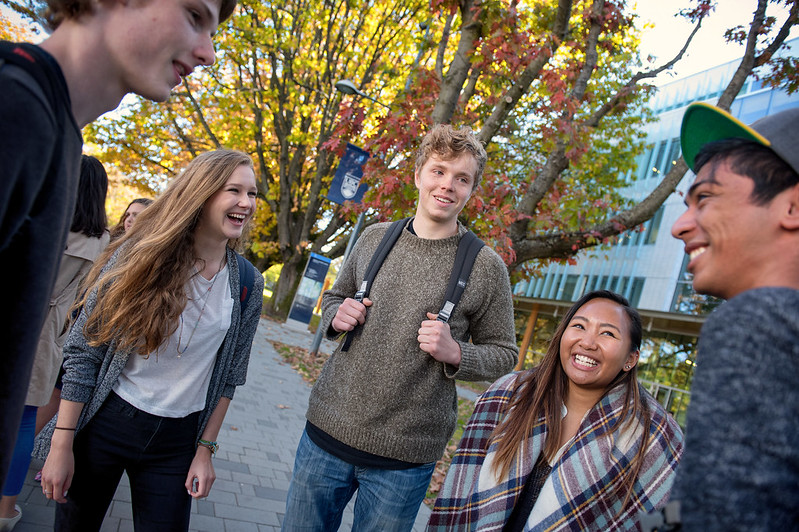In Fall 2019, UBC launched the Wellbeing Strategic Framework, our shared vision and approach for becoming a health and wellbeing promoting university.
Over the past year, departments, units, and community members from across UBC have worked together to advance the targets in the Wellbeing Strategic Framework and help to create campus communities where health and wellbeing for all is championed and supported.
This Annual Report represents UBC's collaborative approach to achieving this vision. And while it shows only a fraction of the work we know is happening across our campuses, we hope that it will inspire you to think of ways to embed wellbeing into your own work, and help us achieve our vision of becoming a health and wellbeing promoting institution.
Scroll down to read the full report, or check out the Annual Report Infographic.
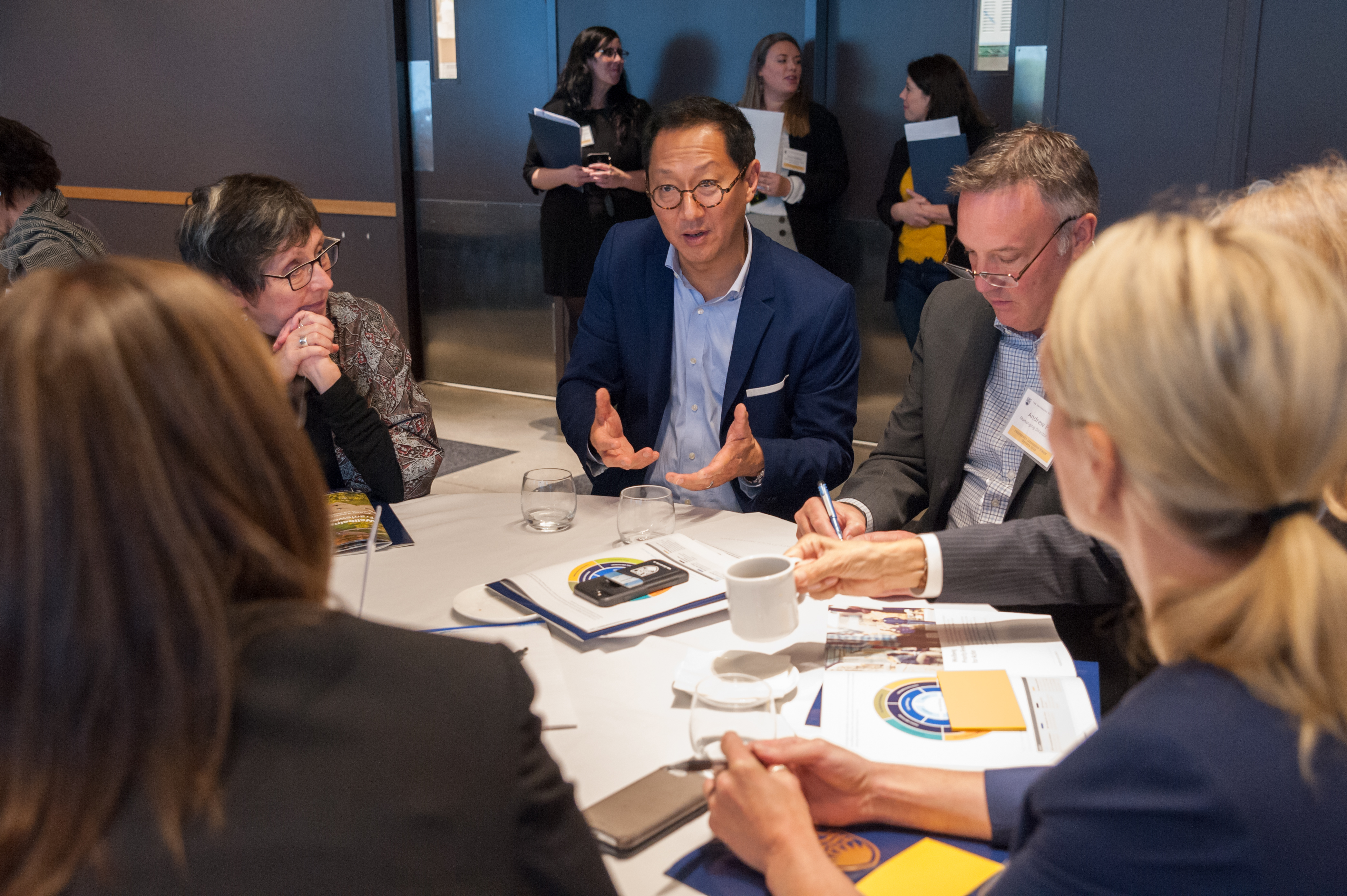
Collaborative Leadership
![]()
UBC is committed to Wellbeing
Community members feel UBC is committed to the wellbeing of its people, places, and communities.
2025 target in development
2019-2020 Metrics
Measure
% of students, staff, and faculty who agree or strongly agree that UBC is committed to the wellbeing of its people, places, and communities
UBC Vancouver
| Population | Data |
| Undergraduate Students | 44% |
UBC Okanagan
| Population | Data |
| Undergraduate Students | 59% |
![]()
All Faculties & Units Take Action
All faculties and units have included wellbeing in their plan and report on progress annually by 2025.
2019-2020 Metrics
Measure
Number of faculties and units
Data collection in progress
Collaborative Leadership Highlights
President's Leadership Forum
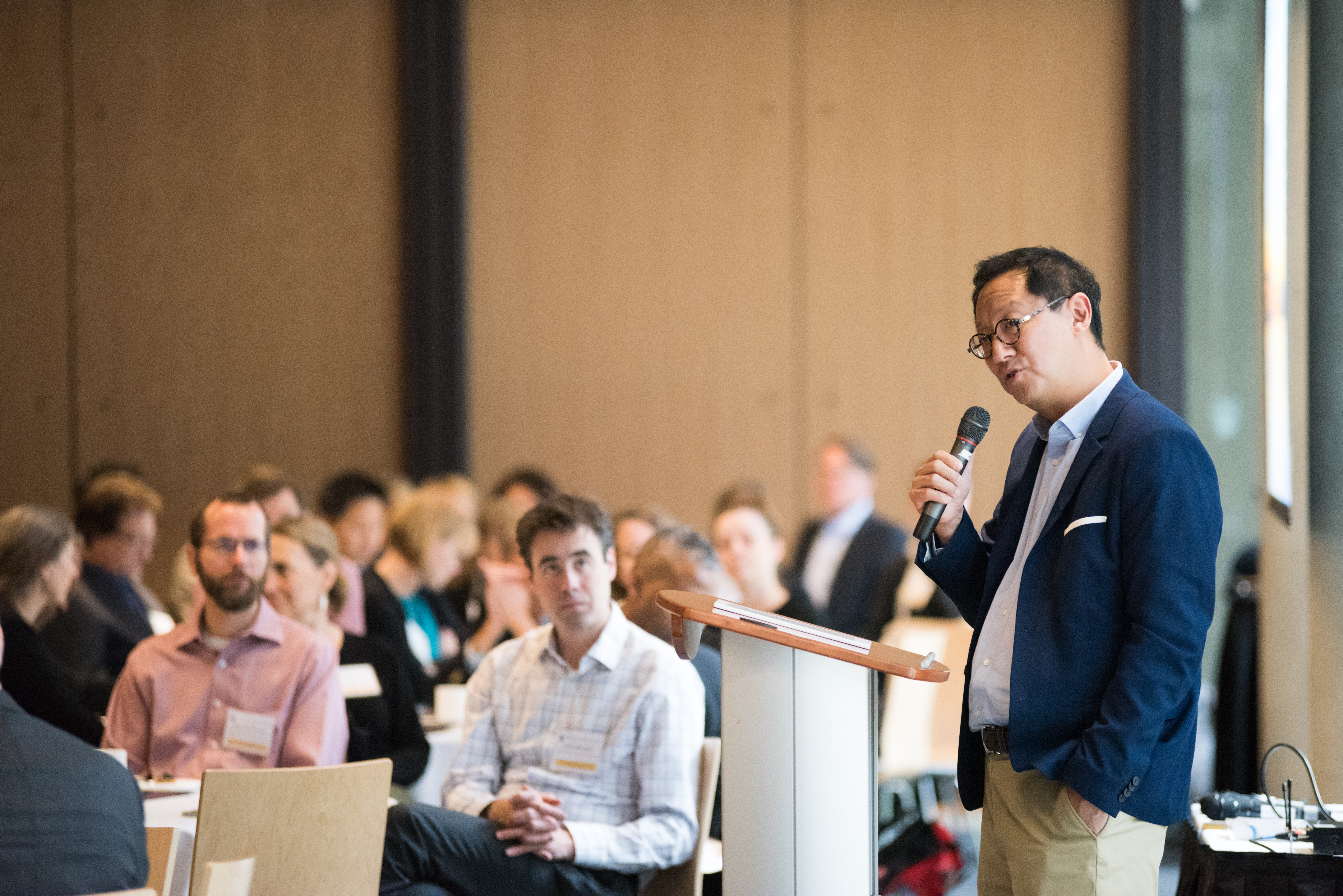
Guided by the Wellbeing Strategic Framework priority areas and targets, 120 senior leaders from both campuses gathered to consider ways to meaningfully embed wellbeing into their portfolios at a system-level, during the President's Leadership Forum in October 2019. Through facilitated discussions, our goal was to steer the conversation towards portfolio-level commitments.
Secondary commitments included unit, university-wide, and external communities. At the end of the conversation, leaders made actionable commitments to embedding wellbeing, with 46 unique, whole-system commitments made across the six priority areas.
UBC pilots the Canadian Campus Wellbeing Survey on our campuses
In November 2019, UBC was one of three post-secondary institutions to pilot the Canadian Campus Wellbeing Survey on both the Vancouver and Okanagan campuses.
The CCWS is specifically designed to help Canadian post-secondary institutions better collect the data they need to support student health and wellbeing during these crucial years. Research shows substantial increases in health-risk behaviour during college and university--from poor mental health, to decreased physical activity, to poor nutrition and increased substance abuse. Post-secondary institutions are in a unique position to help shape a student’s life-long health and wellbeing behaviours. To do this effectively, population-level interventions are needed, however there is currently no coordinated system to collect the necessary health data on Canadian post-secondary students.
The CCWS aims to fill this gap in knowledge by helping institutions better understand and support student health and wellbeing on campuses, identify priorities for intervention, and increase capacity to link research with policy and practices. It will also allow for (non-identified) knowledge and resource sharing to help shape campus systems across the country.
The CCWS will be deployed to other BC campuses in Fall 2020, providing important opportunities for post-secondary institutions to collaborate on wellbeing solutions that benefit their student populations.
Commitments to Okanagan Charter continue across Canada
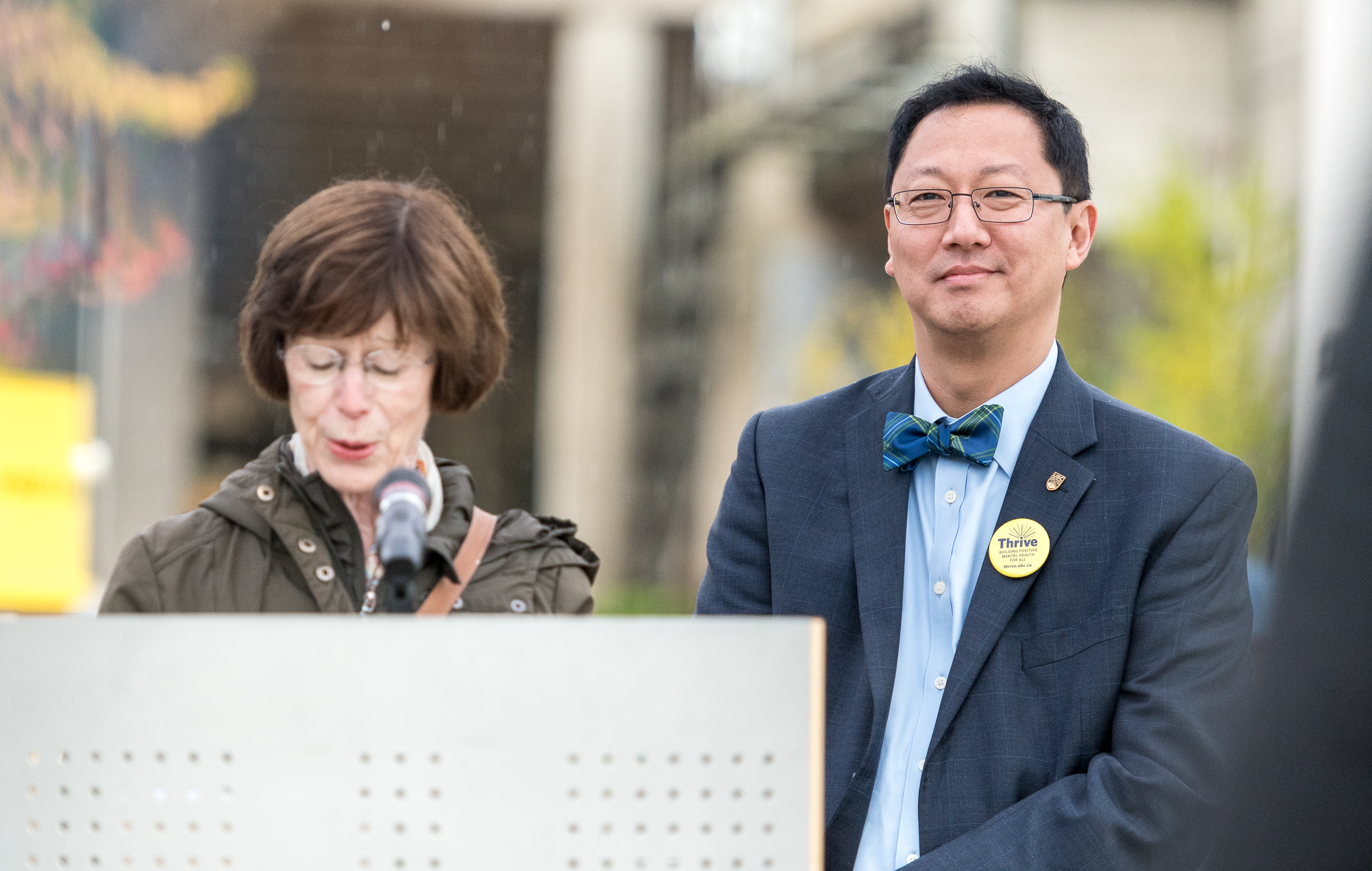
“I am proud of UBC and our partner universities for taking steps to strengthen our communities, both on and off campus” says Professor Santa J. Ono.
In October 2016, UBC proudly became one of the first post-secondary institutions in the world to make a formal commitment to embedding wellbeing on our campuses by adopting the Okanagan Charter, jointly signing alongside five other Canadian institutions.
It was a move that has since sparked numerous commitments here at UBC, and across Canada. Today, 22 Canadian post-secondary institutions have followed suit, adopting the Okanagan Charter and making formal commitments to become health and wellbeing-promoting institutions.
As a co-chair of the Canadian Health Promoting Campuses Network, UBC is committed to supporting other institutions in this process, and is proud to share resources and best practices, collaborate and to work towards changing campus systems to prioritize wellbeing for all.
Student Wellbeing Fund launched!

University is an exciting time, filled with independence, growth, and new experiences. But student life can also be very challenging, with many factors that impact wellbeing. Recognizing the need to help students thrive and achieve their full potential at UBC, the Vice President Student's Office and Development and Alumnae partnered to launch the Student Wellbeing Fund, which directly supports initiatives that impact student wellbeing—from relieving food insecurity, to providing mental health literacy resources.
The fund launched with “Change Starts at Breakfast” during Thrive month in November. Alumni donated $10, with half going towards purchasing a student a surprise breakfast (served by President Santa Ono and VP of Students Ainsley Carry!), and the other half going directly into the fund for future projects to support student wellbeing.
Aside from being a great way to kick off a wonderful new donor initiative, the event left many students smiling, satiated, and knowing that their alumni community cares about them!
Student-led research supports wellbeing commitments
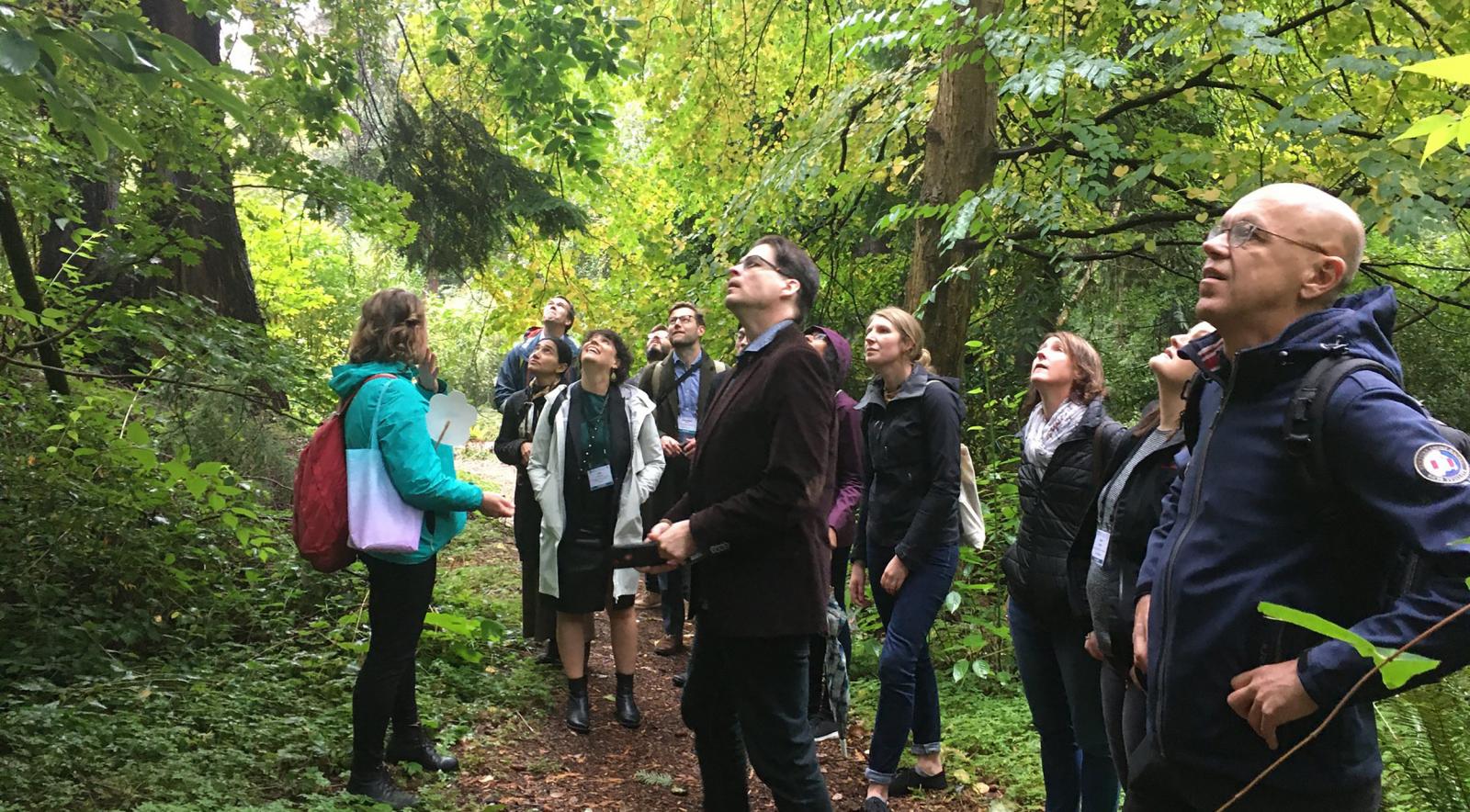
From deepening our understanding of food security on our campuses, to providing recommendations for the UBC Drinks Tap Water campaign, to evaluating our smoke and vape-free precincts, the SEEDS Sustainability Program has been instrumental to UBC Wellbeing's exploration of our wellbeing commitments.
The program, takes a "campus as a living lab" approach to tackling real-life operational sustainability problems, creating applied research and interdisciplinary partnerships between students, faculty, staff and community partners.
This year 263 UBC Vancouver students undertook student-led research through SEEDS to help support our wellbeing commitments and advance our vision of becoming a health and wellbeing promoting university.
Building Academic Tenacity in Student for Improved Wellbeing

“We know that university is an academic institution and that it focuses on transmitting knowledge and generating knowledge, but we believe in order to achieve that, we also need to address people’s wellbeing.” says Michael Lee, Faculty member in the Department of Occupational Science and Occupational Therapy.
Over the past three years, a TLEF-funded research project Building Academic Tenacity in Students for Improved Wellbeing, Deeper Learning and Increased Success has sought to do just that. Supported by Health Promotion and Education, the project has engaged 15 faculty member collaborators from 10 different Faculties and schools in implementing teaching practices to promote student wellbeing and improve their ability to thrive a stressful academic environment.
Now in its final year, the project is sharing its findings with the UBC community. Eight tool kits highlighting tangible strategies and featuring faculty stories were developed, to help other faculty members who are interested in creating a health-promoting learning environment. Strategies include creating connections through office hours, to taking learning outdoors, to embedding mental health literacy and more.
UBC at the International Health Promoting Campuses Symposium
Casey Hamilton, Campus Health Specialist at UBC Okanagan, presented on Assessing the feasibility of active study stations on a university campus, at the International Health Promoting Campuses Symposium. This one-day conference in Rotorua, New Zealand, convened delegates from around the world to share best practices related to activating the Okanagan Charter.
Students indicated a need for more opportunities for free, accessible and easily-available physical activity opportunities. A treadmill desk and bike desk were installed in the campus library and users were invited to complete an online survey to gather feedback on the use of active study stations.
$90,000 in Wellbeing Strategic Initiatives funds granted
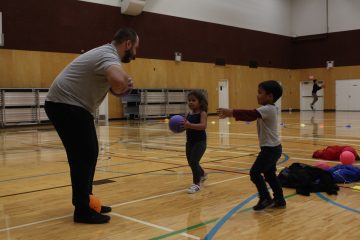
Across our campuses, departments and units are collaborating to help advance UBC’s commitments to the Okanagan Charter. To support these projects and initiatives, the UBC Wellbeing Strategic Initiatives Fund was established, granting up to $5,000 to projects in our six wellbeing priority areas.
Last year, $90,000 was granted to 24 capacity-building projects to support health and wellbeing at UBC—from the Musqueum Multisport Physical Literacy Program developed by UBC Kinesiology, to Acadia Park’s Embracing Motherhood support group, to community kitchens at the UBC Farm and more.
Collaborative Leadership networks at UBC Okanagan
To ensure collaboration, coordination and consideration of wellbeing in all aspects of life and learning on campus, the UBC Wellbeing Okanagan Action Network and the Wellbeing Teaching & Learning Network were launched at UBC Okanagan.
Collaborative Leadership Infographic
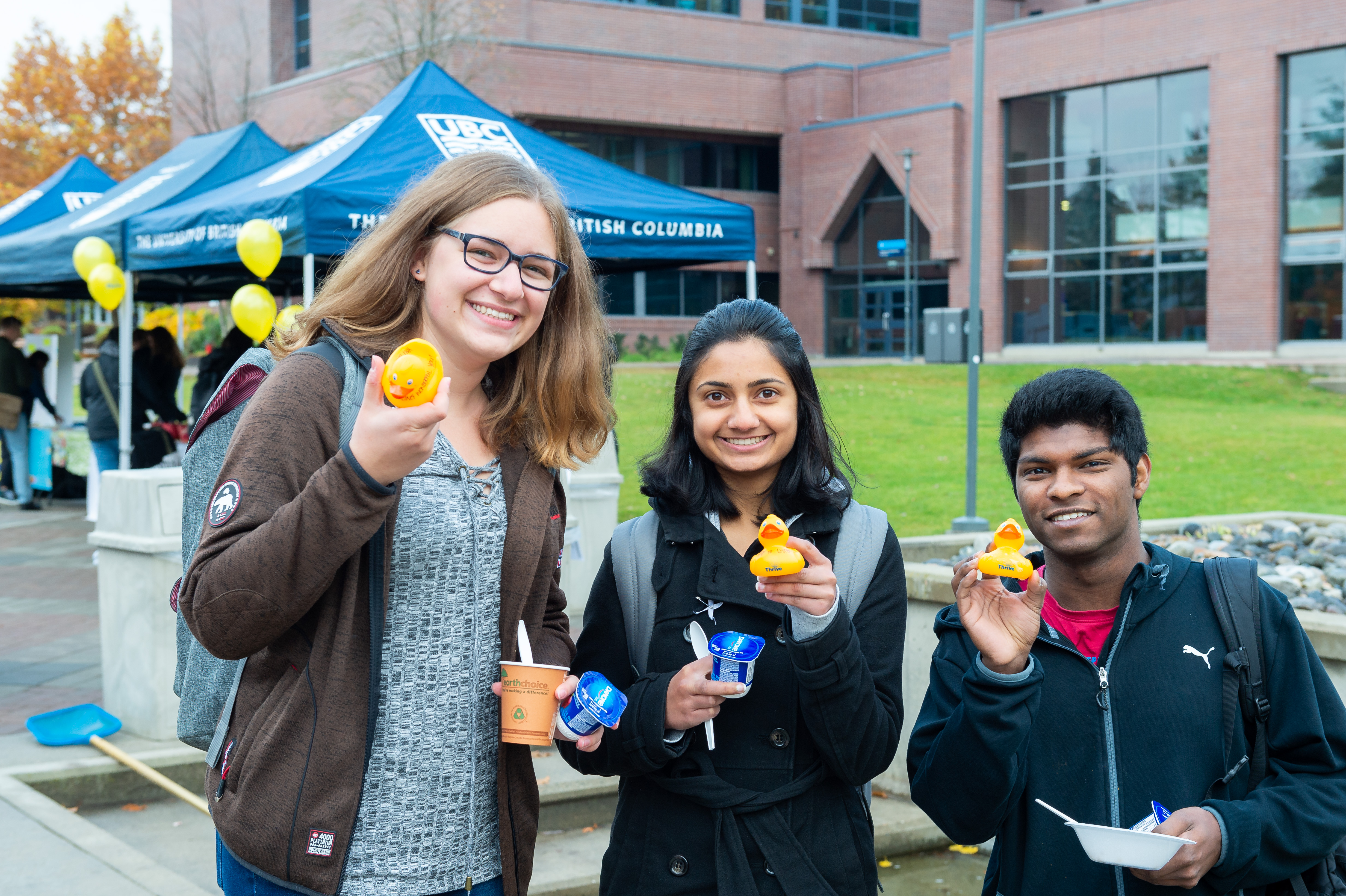
Mental Health and Resilience
![]()
UBC Cares
Increase community members who feel mental health is a UBC priority by 2025.
2025 target in development
2019-2020 Metrics
Measure
At UBC, I feel that student, staff and faculty mental and emotional wellbeing is a priority*
UBC Vancouver
| Population | Data |
| Undergraduate Students | 29% |
| Graduate Students | 36% |
UBC Okanagan
| Population | Data |
| Undergraduate Students | 45% |
| Graduate Students | 52% |
* % who strongly agree or agree
![]()
Mental Health Literacy
10% increase in community members reporting access to opportunities to develop mental health literacy by 2025.
2019-2020 Metrics
Measure
I know how to access benefits, services and programs that support my health and wellbeing*
UBC Vancouver
| Population | Data |
| Faculty and Staff | 80% |
UBC Okanagan
| Population | Data |
| Faculty and Staff | 79% |
Measure
I feel supported in my workplace to make decisions that benefit my physical and mental health*
UBC Vancouver
| Population | Data |
| Faculty and Staff | 68% |
UBC Okanagan
| Population | Data |
| Faculty and Staff | 59% |
Measure
If I needed to seek professional help for my mental or emotional health, I would know where to access campus-based resources (online or in-person).*
UBC Vancouver
| Population | Data |
| Undergraduate Students | 36% |
| Graduate Students | 42% |
UBC Okanagan
| Population | Data |
| Undergraduate Students | 48% |
| Graduate Students | 50% |
Measure
If I needed to seek professional help for my mental or emotional health, I would know where to go off campus.*
UBC Vancouver
| Population | Data |
| Undergraduate Students | 27% |
| Graduate Students | 32% |
UBC Okanagan
| Population | Data |
| Undergraduate Students | 29% |
| Graduate Students | 40% |
Measure
I have been able to manage stress successfully this school year*
UBC Vancouver
| Population | Data |
| Undergraduate Students | 45% |
UBC Okanagan
| Population | Data |
| Undergraduate Students | 46% |
Measure
The UBC campus climate encourages free and open discussion about mental and emotional health*
UBC Vancouver
| Population | Data |
| Undergraduate Students | 47% |
| Graduate Students | 45% |
UBC Okanagan
| Population | Data |
| Undergraduate Students | 59% |
| Graduate Students | 55% |
* % who strongly agree or agree
Mental Health and Resilience Highlights
Celebrating 10 Year of Thrive at UBC
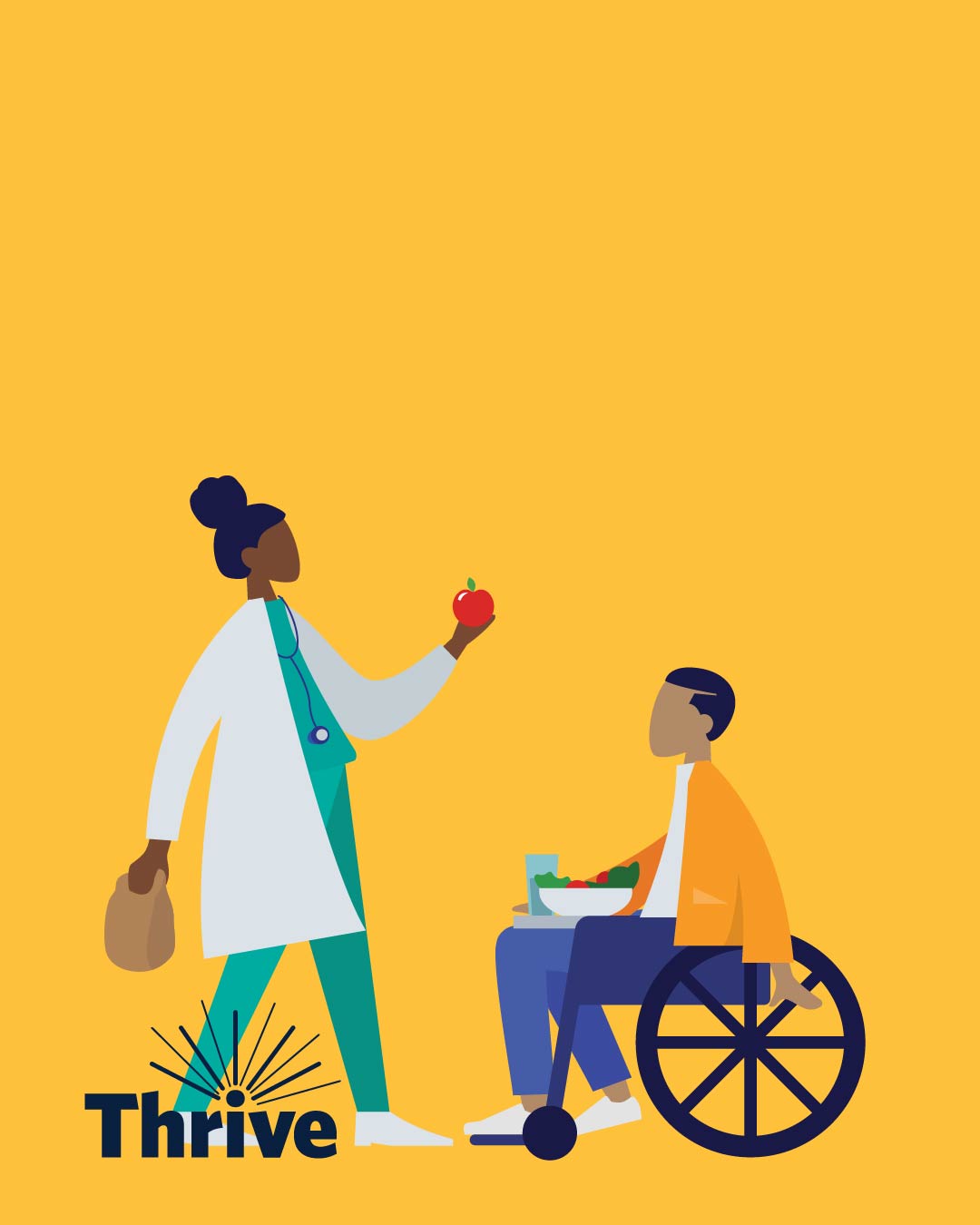
UBC celebrated the 10-year anniversary of Thrive with an entire month of events and initiatives aimed at fostering and maintaining mental health. and providing an avenue to enables students, faculty, and staff to explore resources, clubs, and activities dedicated to exploring their pathway to mental health.
From "doggy day" pop-up events, to mental health workshops and training, to cooking classes, 113 campus partners coordinated 240 + Thrive month events and workshops, sparking important conversations about mental health and ways to support it. This year, the campaign focused on the Thrive 5—research-informed ways to support mental health—which include social connection, physical activity, healthy eating, helping others, and sleeping well.
Thrive originated at UBC as a way to reduce stigma around mental health and as of this year, has been adopted by eighteen other campuses across Canada.
Empower Me extended to all UBC students
This fall, Empower Me, was made available to all UBC students, increasing capacity to help students in need of counseling. The program provided counseling and life coaching, free for all students—with the option of getting help online, in person, or by phone. The program has now transitioned to UBC Student Assistance Program (SAP), offered by Aspira. UBC SAP provides free, 24/7 personal counselling and life coaching for all UBC students, including those who are currently learning from overseas.
Services are available by phone, video, face to face (where available), e-counselling and in multiple languages. Also included are Aspiria’s AWARE Mindfulness Program and Computerized Cognitive Behavioral Therapy (CCBT) for students who prefer self-guided options.
Enhanced capacity for mental health literacy and education
On both the Vancouver and Okanagan campuses, health promoters have been building capacity by bringing mental health literacy and education to faculty, staff and students. In fact, over 100 mental health workshops were delivered by units in HR and Student Services over the course of the year.
Vancouver
- Knowing how to foster and maintain mental health, identify signs that you need help and know how to ask for it are important skills for students to develop. This year, the Health Promotion and Education unit incorporated mental health literacy into student orientations, including Jumpstart, to ensure students started the year with the mental health literacy tools and resources they need to thrive.
- HR and Health Promotion and Education partnered to offer 38 QPR workshops and five Mental Health First Aid Workshops, which engaged 782 faculty, staff and student participants in mental health literacy capacity-building at UBC Vancouver.
Okanagan
- Transitioning from post-secondary into a career can bring many new challenges and unknowns. “Connecting the Dots” workshops were offered to equip student leaders with the resiliency skills they need as they make this transition.
- Enhanced capacity for training sessions such as Mental Health First Aid, Applied Suicide Intervention Skills Training, and Question Persuade Refer (QPR).
UBC Okanagan hosted the first Jack.org summit in the Interior region with leadership from Campus Health. Jack.org is Canada's only charity training and empowering young leaders to revolutionize mental health.
Creating a safer, healthier workplace with Health, Wellbeing and Benefits.
We spend most of our waking hours at work, and our workplace environment can have a substantial impact on mental health and wellbeing. HR's Health, Wellbeing & Benefits team create inspiring workplace environments that that promote employee health and wellbeing through a number of programs, workshops, and initiatives aimed at supporting mental health.
Highlights include:
- 747 participants in the Mindwell 30-Day Mindfulness Challenge
- 2500+ participants in Not Myself Today, a workplace wellbeing initiative created by the Canadian Mental Health Association
- An 85% increase in the number of managers trained and certified in The Working Mind for Managers, a training program aimed at increasing mental health literacy.
- Incorporating training into the Managing@UBC program curriculum at both UBC Vancouver and UBC Okanagan.
- Increased capacity to deliver Mental Health First Aid
- Participants rated the workshops 85% or higher in effectively enhancing mental health literacy
- Workshops were rated 99% successful at providing knowledge and changing attitudes.
- Workshops were rated 90% successful in the application of new knowledge into long term behavioural change.
Mental Health and Resilience Infographic
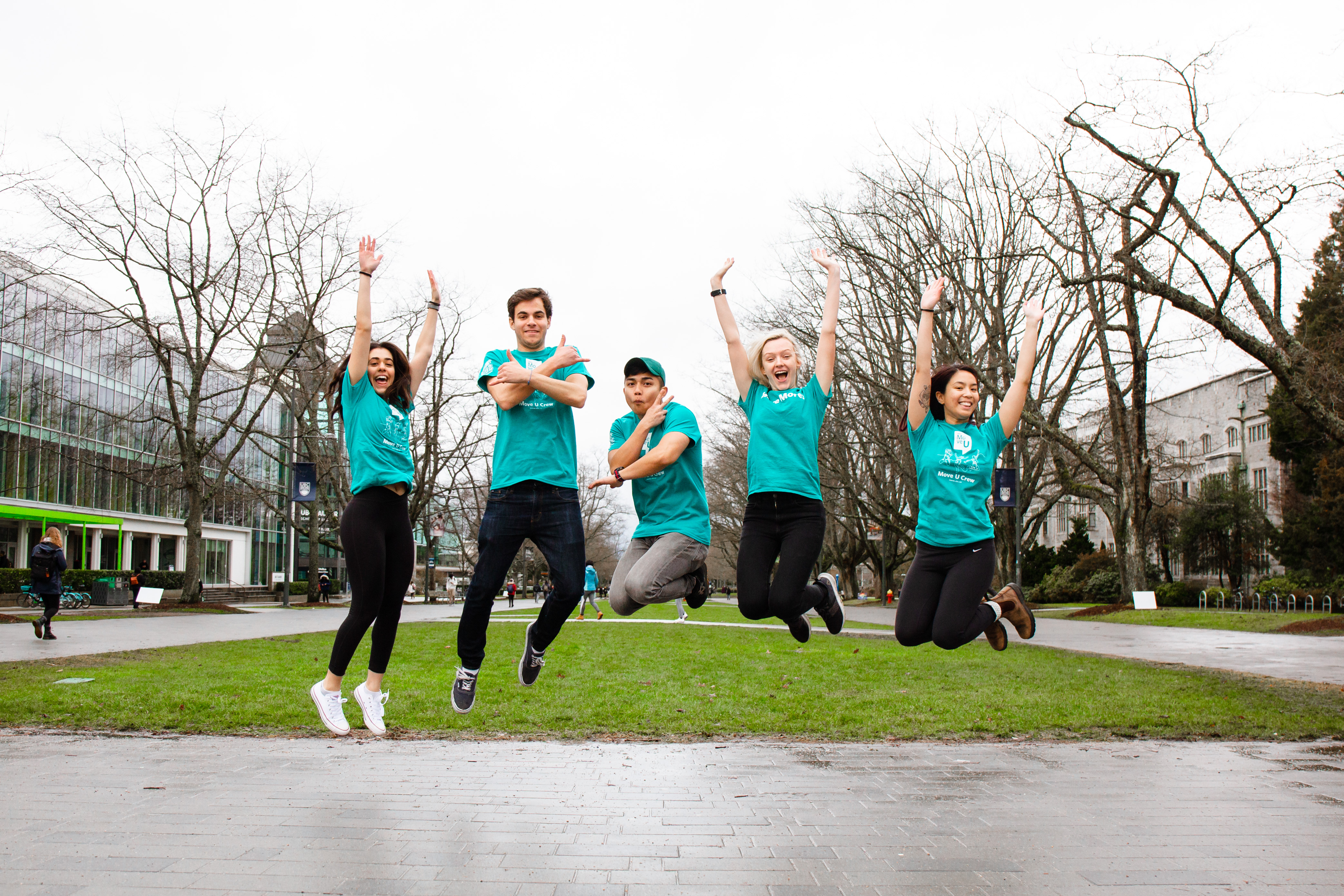
Physical Activity
![]()
Move More
10% reduction in the prevalence of physical inactivity for UBC community members by 2025.
2019-2020 Metrics
Measure
% of students, staff, and faculty who report not meeting the Canadian physical activity guidelines.
UBC Vancouver
| Population | Data |
| Undergraduate Students | 45% |
| Graduate Students | 37% |
UBC Okanagan
| Population | Data |
| Undergraduate Students | 38% |
| Graduate Students | 40% |
![]()
Diverse Community, Diverse Programming
10% increase in UBC community members' satisfaction with recreation facilities and programs by 2025.
2019-2020 Metrics
Measure
How satisfied are you with the availability of recreation programs on campus?*
UBC Vancouver
| Population | Data |
| Undergraduate Students | 48% |
UBC Okanagan
| Population | Data |
| Undergraduate Students | 33% |
Measure
How satisfied are you with the quality of recreation programs on campus?*
UBC Vancouver
| Population | Data |
| Undergraduate Students | 48% |
UBC Okanagan
| Population | Data |
| Undergraduate Students | 34% |
Measure
How satisfied are you with the quality of recreation facilities on campus?*
UBC Vancouver
| Population | Data |
| Undergraduate Students | 46% |
UBC Okanagan
| Population | Data |
| Undergraduate Students | 30% |
*% who are very satisfied or satisfied
Physical Activity Highlights
Move UBC
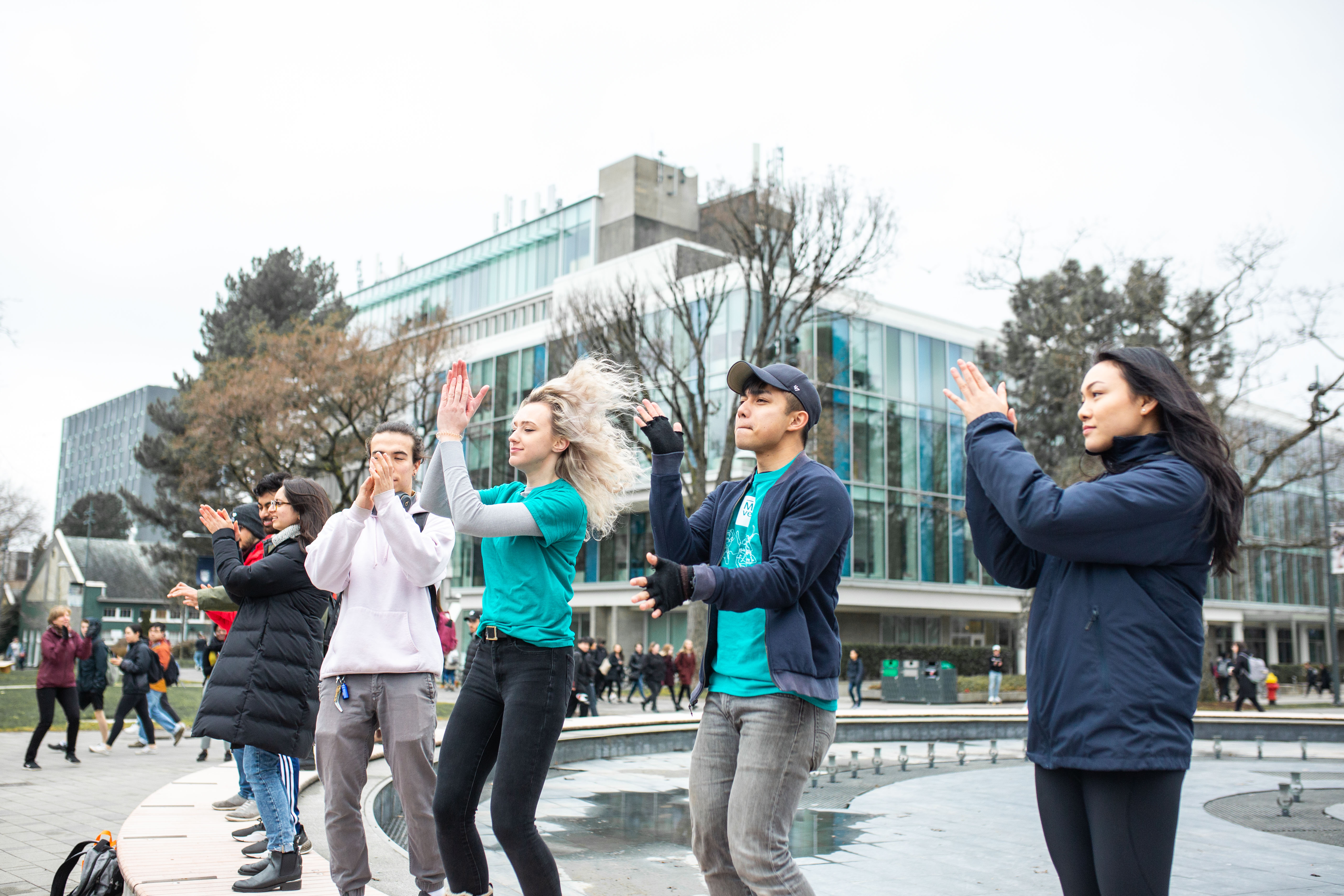
Move More, Move Well, Keep Moving. With that mantra in mind, the 4th annual Move UBC campaign kicked off in February, bringing a month of physical fun to UBC Vancouver and UBC Okanagan.
Move UBC is an annual campaign dedicated to increasing physical activity and reducing sedentary behaviour for our entire community- faculty, staff, and students. Working in classrooms, labs, and offices, attending meetings, and using computers all equal less time on our feet and more time sitting. That's why Move UBC committed to creating an environment where movement is championed and supported.
A number of new initiatives were piloted during the campaign. A "Move UBC Makeover" of the Neville Scarfe building, that incorporated visual prompts throughout the building to encourage people to be active. The Move U Off-Campus Pass gave students the chance to try something new with free classes at studios all over the Lower Mainland. And the Move UBC Research roundtable brought together researchers from seven different disciplines to share their research on physical activity and discuss ways to support health promoting campuses.
Throughout the month, 90+ Move UBC events encouraged faculty, staff, and students to move more and try something new. 71% of survey respondents discovered new ways to be physically active during Move UBC, with 64% planning on continuing to move more.
Physical activity referral program offers peer mentorship
Exercise can be a powerful form of medicine. That's why at UBC Okanagan, Recreation partnered with Health and Wellness and the School of Health and Exercise Sciences to offer an Physical Activity Referral Program.
Students with physical or mental health related concerns were referred to the program by healthcare professionals and UBCO Health and Wellness. Students received physical activity-related mentorship from peers in the Human Kinetics program to increase their wellbeing.
Move Move, Learn More
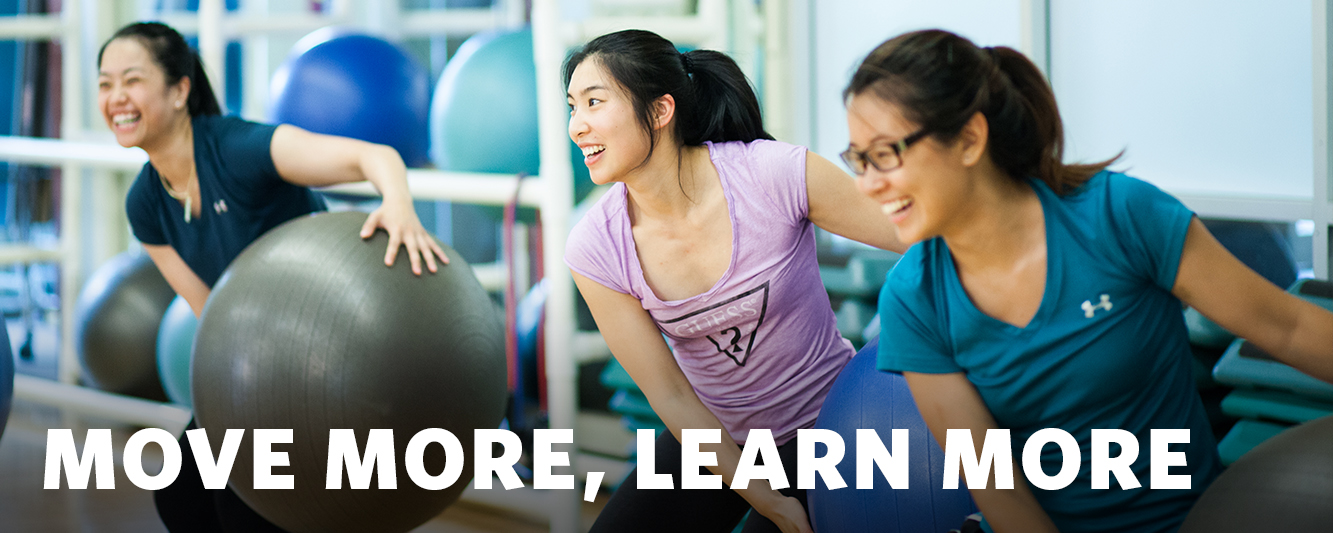
Research shows that moving more can help improve learning outcomes, boost mood and mental health,and reduce stress. For Move More, Learn More participant Scarlett Wu, the program help show that small changes can add up to big impacts when it comes to physical and mental health.
"I did almost no physical exercise on a regular basis, which has changed a lot since the program" says Wu. "I knew exercise was good for mental wellbeing, but it actually never had such effect on myself. After I tried for about a month, I can feel that my mood goes up after exercise. This is also one thing that I am thankful to this program and makes me want to keep the habit of exercise."
Move More, Learn More is an 8-week program designed for Asian female students who want to improve their health and fitness. The program takes a holistic, integrated approach to student wellbeing, and includes two scheduled weekly sessions with a different health learning topic, such as nutrition or mindfulness, and a private group physical activity session.
"With regard to our Monday classes, like 50% of the information was new to me so it enhanced my understanding of how one can work on well-being, which pushed me to take them into actions" says Wu. "I grew up as someone that was neither good at nor liked to exercise or play sports. My mindset has also changed since the program. I enjoyed many of the recreation programs I tried. Now I know physical exercise can be fun and I have a positive attitude towards it when I exercise."
Perfect partnership for promoting physical activity
UBC Recreation, School of Kinesiology, and UBC Wellbeing partnered to facilitate a student-led fitness testing pilot with the School of Music and Thunderbird Sports Clubs. During the pilot, Kinesiology students provided VO2 Max testing to their peers in Music and Thunderbird Sports Club, followed by coaching on how to reach physical activity goals.
UBC Recreation, Health Promotion and Education, the Faculty of Arts, School of Kinesiology, and Faculty of Education partnered to assess the impact of movement breaks in the classroom. A Physical Activity Toolkit was created for educators to embed movement into their learning environments.
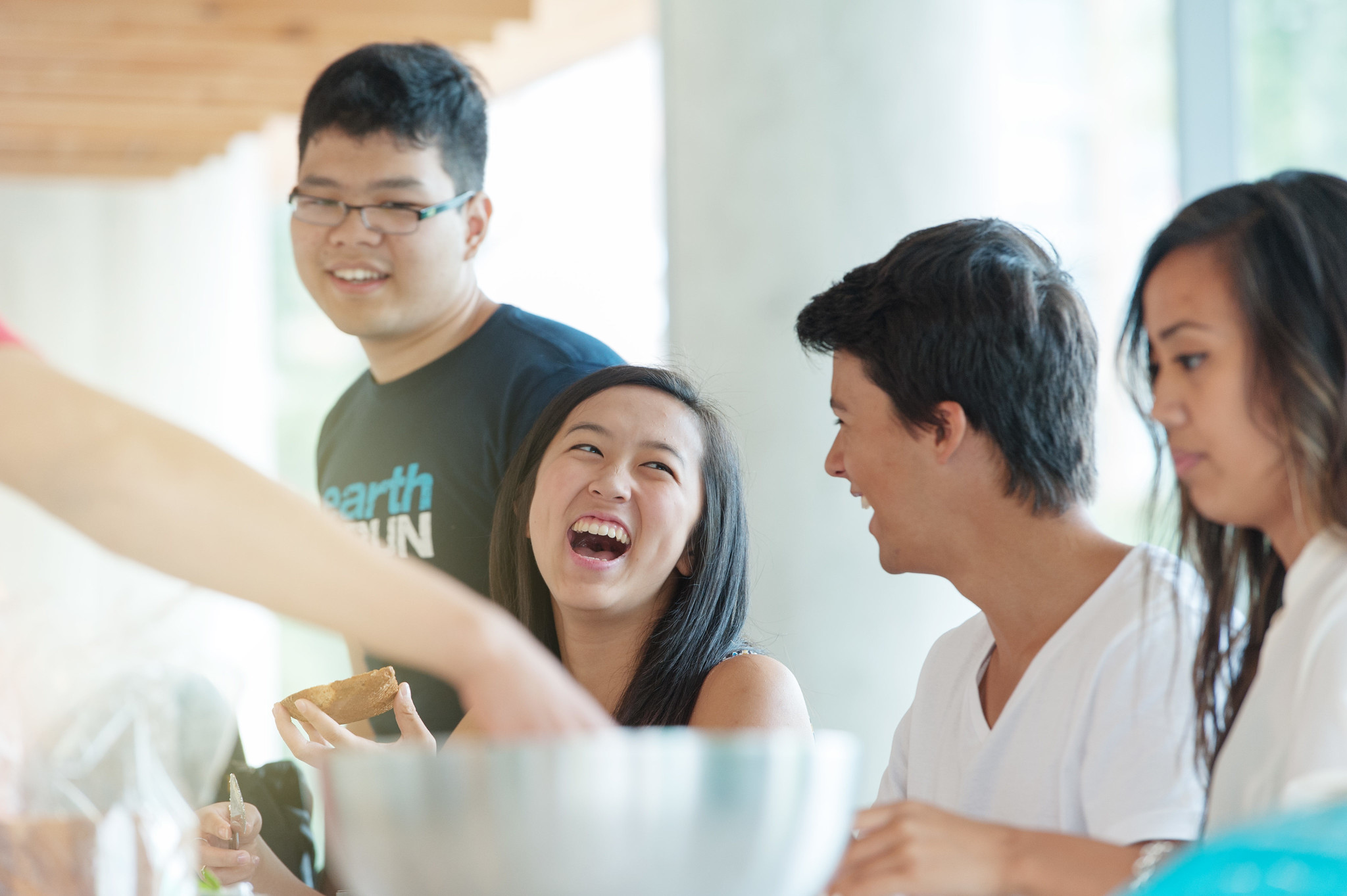
Food and Nutrition
![]()
Increase Food Security
Reduce food insecurity for UBC community members by 2025.
Target in development
2019-2020 Metrics
Measure
% of population reporting food insecurity
UBC Vancouver
| Population | Data |
| Undergraduate Students | 37% |
| Graduate Students | 29% |
UBC Okanagan
| Population | Data |
| Undergraduate Students | 42% |
| Graduate Students | 42% |
![]()
Healthy Beverage Consumption
50% reduction in sugar-sweetened beverage consumption on our campuses by 2025.
2019-2020 Metrics
Measure
% of sugar-sweetened beverages purchases
UBC Vancouver *
| Population | Data |
| UBC Food Services and Athletics and Recreation | 35% |
| AMS | 68% |
*Sept 2019-Aug 2020
UBC Okanagan
| Population | Data |
| UBC Food Services | TBD |
Measure
% of vending machines that are Healthy Beverage Initiative compliant
UBC Vancouver
25.7%
UBC Okanagan
31%
Measure
% buildings that have at least one tap water fixture with bottle filling capacity
UBC Vancouver
52 of 57
UBC Okanagan
13 of 13
Food and Nutrition Highlights
Healthy Beverage Initiative
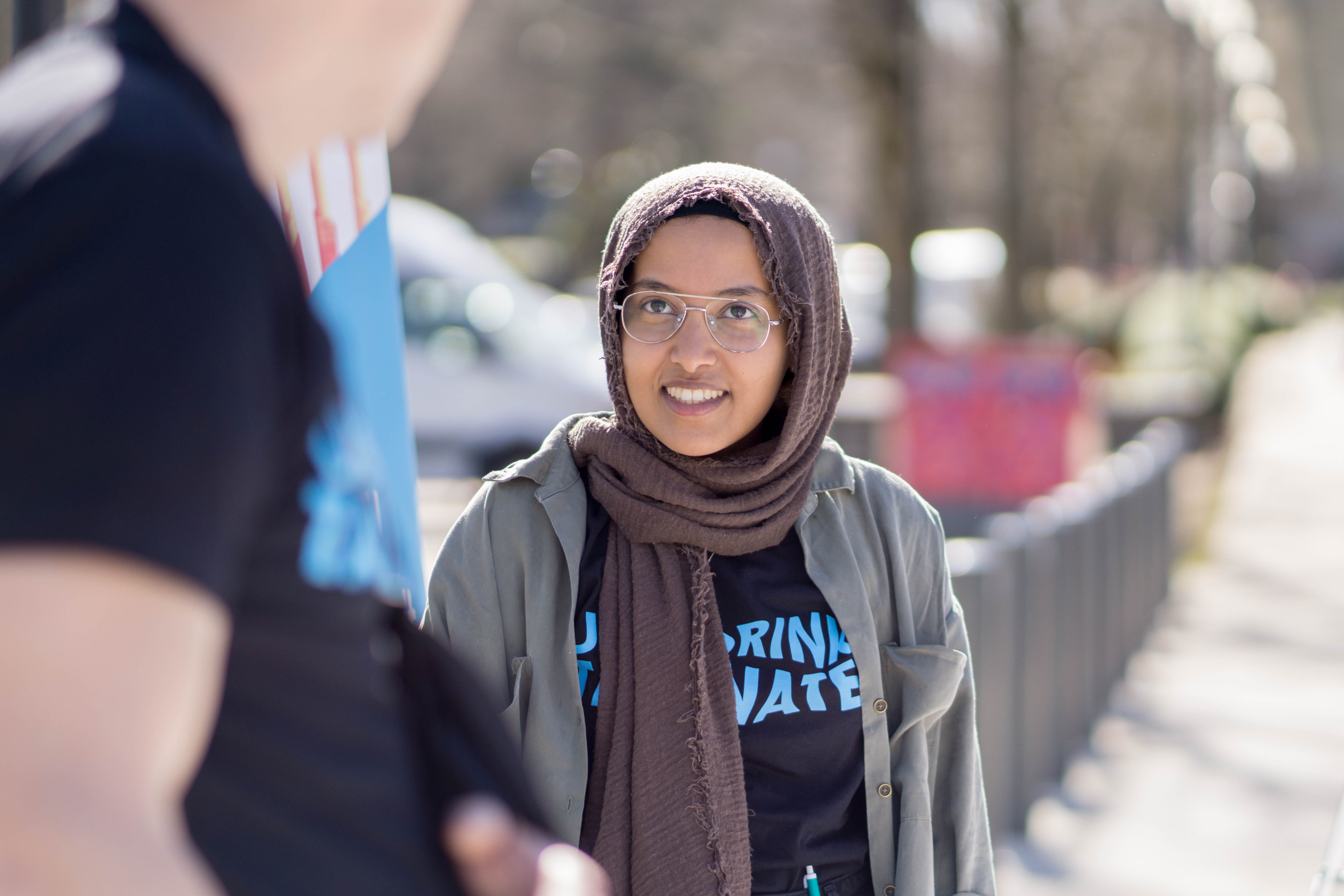
Sugar sweetened beverages are the single-largest contributor of added sugar in the diet, and can have huge public health implications.
Recognizing this, the Food and Nutrition committee and all major food-provider stakeholders worked together with students, staff and faculty across the university to implement a number of interventions to support our target of reducing sugar sweetened beverages on our campuses through three key actions:
Action 1: Encourage drinking water
- The launch of the UBC Drinks Tap Water campaign in March 2019 encouraged community members to take to the tap instead of sugary bottled beverages. The campaign ran for three weeks and promoted the safety and quality of BC's world-class tap water with a fun, tongue-in cheek approach.
- 57% of survey respondents said they are now more likely to drink tap water.
- UBC Drinks Tap Water also spurred a number of SEEDS projects. Student-led research groups collaborated on helping UBC Wellbeing better understand how to promote tap water to international student, a demographic that was noted to be less likely to drink tap water, due to perceived lack of safety of tap water.
SEEDS Projects:
- Nudging the Tap Open
- Promoting Tap Water Among International Students
- Effectiveness of Posters to Promote Tap Water
Action 2: Promote healthier beverage choices with our community.
- At UBC Okanagan, healthy beverage choices were promoted for meetings and catered events, with 68% of catering orders provided with Healthy Beverage Initiative options.
- Sugar sweetened beverages were taken off the menu at a number of large campus events, including the Faculty and Staff Back to School BBQ and replaced with healthier choices such as flavoured waters.
Action 3: Modify our environment to support healthier beverage consumption.
A healthier environment helps inspire healthier choices. Over the past year, food service providers have focused on making meaningful changes to the beverage environment to make it easier to make healthier beverage choices.
- 25% of vending machines at UBC Vancouver were converted to comply with the provincial Healthier Choices in Vending Machines Policy, which sets minimum nutrient standards for prepackaged food and beverages so a range of healthier options are available in public buildings.
- Sugar sweetened beverages were removed from select residence dining halls and retail outlets and replaced with sugar-free options. Postdoctoral fellow Katie Di Sebastiano spent several month evaluating the impacts of the removal, including sales and student perception and a paper titled The University of British Columbia healthy beverage initiative: changing the beverage landscape on a large post-secondary campus has been published.
Food Security Initiative launched to collaboratively explore campus food insecurity
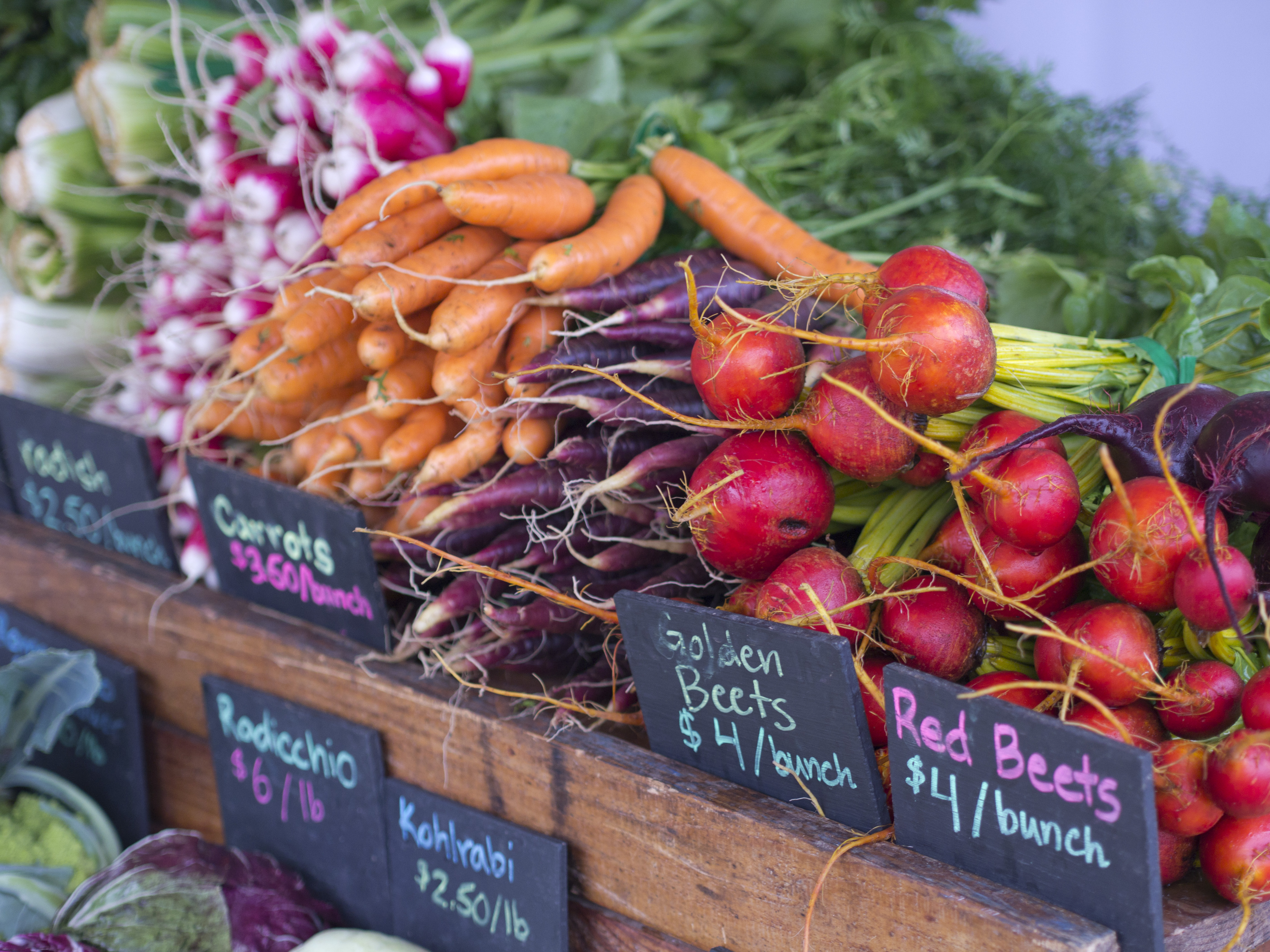
Food insecurity is a major issue on college campuses across Canada, and UBC is no exception—recent data shows that 37% of undergrad students at UBC Vancouver, and 42% at UBC Okanagan experience some degree of food insecurity.
In Spring 2019, SEEDS and UBC Wellbeing hosted a Food Security Action Symposium, bringing together stakeholders to share student-led research, identify gaps in our knowledge and data, and collaborate on actions to better address campus-based food insecurity. A Food insecurity Action Team (FIAT), was formed to work on research and community outreach, support existing campus initiatives, and drive new opportunities.
Building off of this collaboration, and with support from the Board of Governors, the Food Security Initiative launched in February 2020 as an interdisciplinary partnership between UBC Wellbeing and the UBC Food Systems Project, taking a holistic, university-wide, and systems-based approach to increasing food security.
Launch of Fooood Cafe at UBC Vancouver
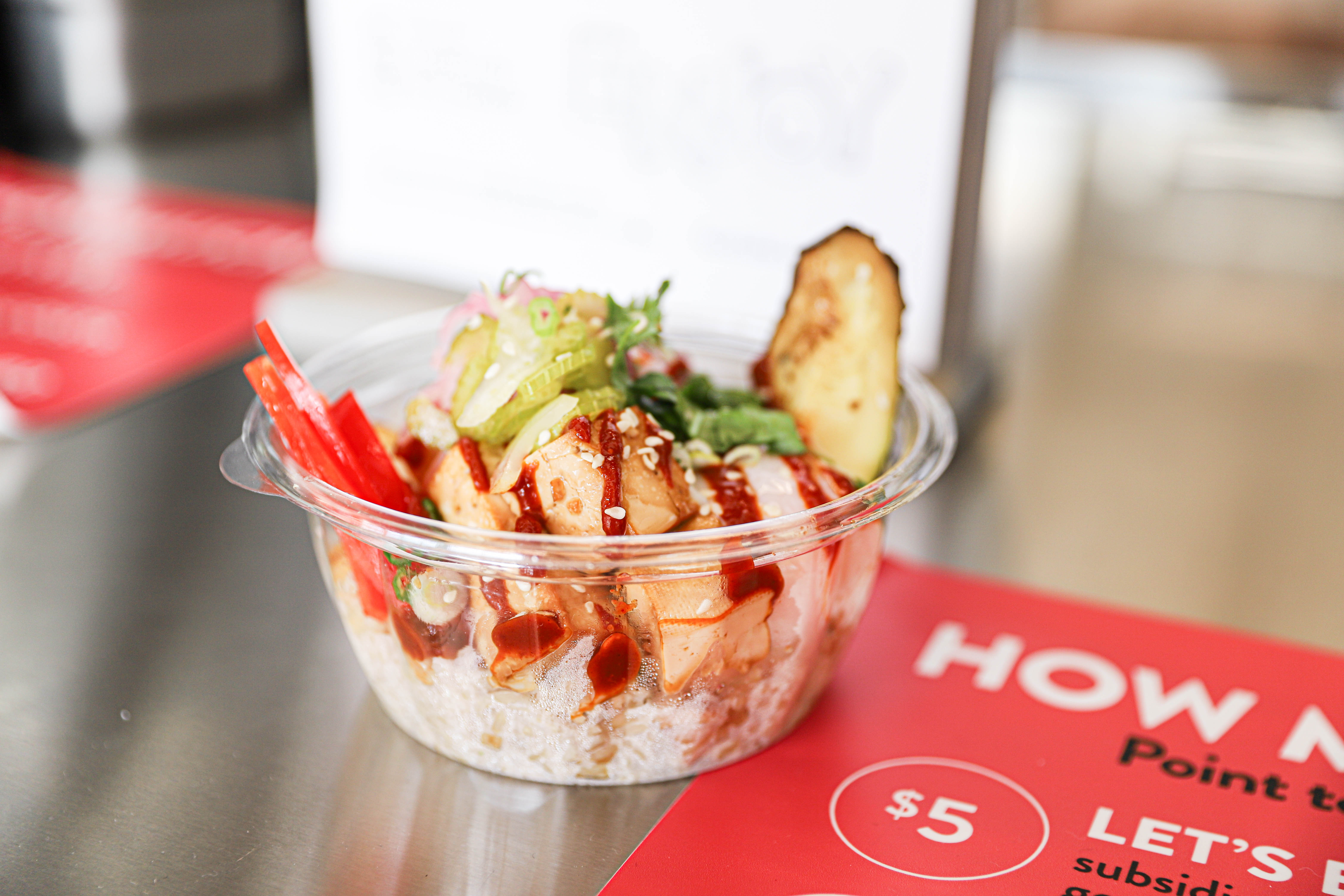
In direct response to increased awareness of food insecurity at UBC Vancouver, UBC Food Services launched FOOOOD, a "pay what you can" cafe, located in the Earth Sciences Building.
FOOOOD offers nutritious, wholesome meals, prepared by UBC's Red Seal Apprentice chefs. Purchase a meal at FOOOOD and you'll be asked to choose from a tiered payment system. $5 provides a meal partially subsidized by UBC Food Services and donors, $10 covers costs, and $15 pays it forward by providing funds to help subsidize meals for others.
While discounting food is not a long-term solution to food insecurity, Fooood Cafe is one small, exploratory step in UBC's efforts to better understand food insecurity on our campuses.
UBC Okanagan switches to in-house model
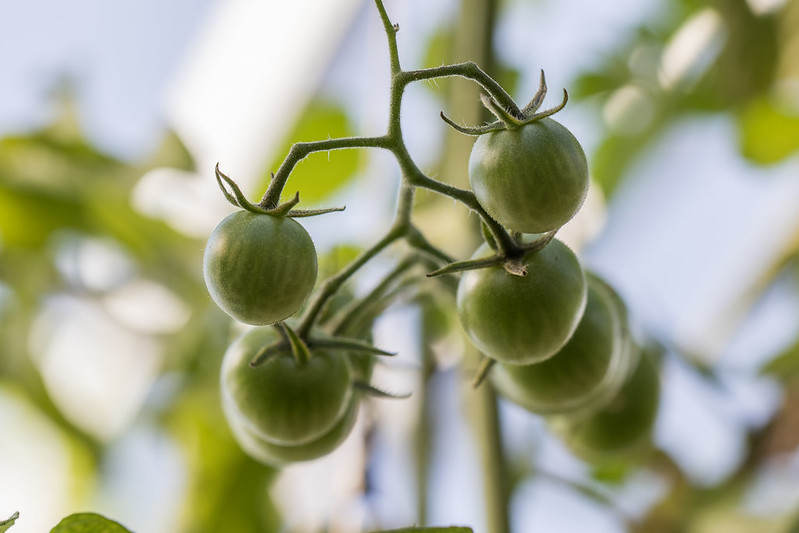
Fueling an entire campus is no easy task–but for UBC Okanagan Food Services, making sure our faculty,staff, and students have access to nutritious choices is one way to support the important work happening in our classrooms, workplaces, and research labs.
Following in the footsteps of UBC Vancouver, UBC Okanagan Food Services transitioned to an in-house food services model, prioritizing healthy, local food, and sustainable choices. You'll now find 100% Oceanwise fish and seafood, lots of plant-based options, and plenty of Fairtrade products, available on campus.
Launch of VOICE 5, Food Security at UBCO: What’s your recipe?,
Led by Campus Health, UBC Okanagan's VOICE research projects have played a crucial role in supporting the development and design of a health promoting campus.
In 2019, they launched VOICE 5, Food Security at UBCO: What’s your recipe?, a longitudinal research study exploring systemic factors that support and hinder student food security. Over a two-year period (2019-2021), VOICE will focus on understanding the lived experience of food insecure students, identifying priorities and opportunities to reduce student food insecurity, and identifying priorities and opportunities for action to reduce student food insecurity.
Food and Nutrition Infographic
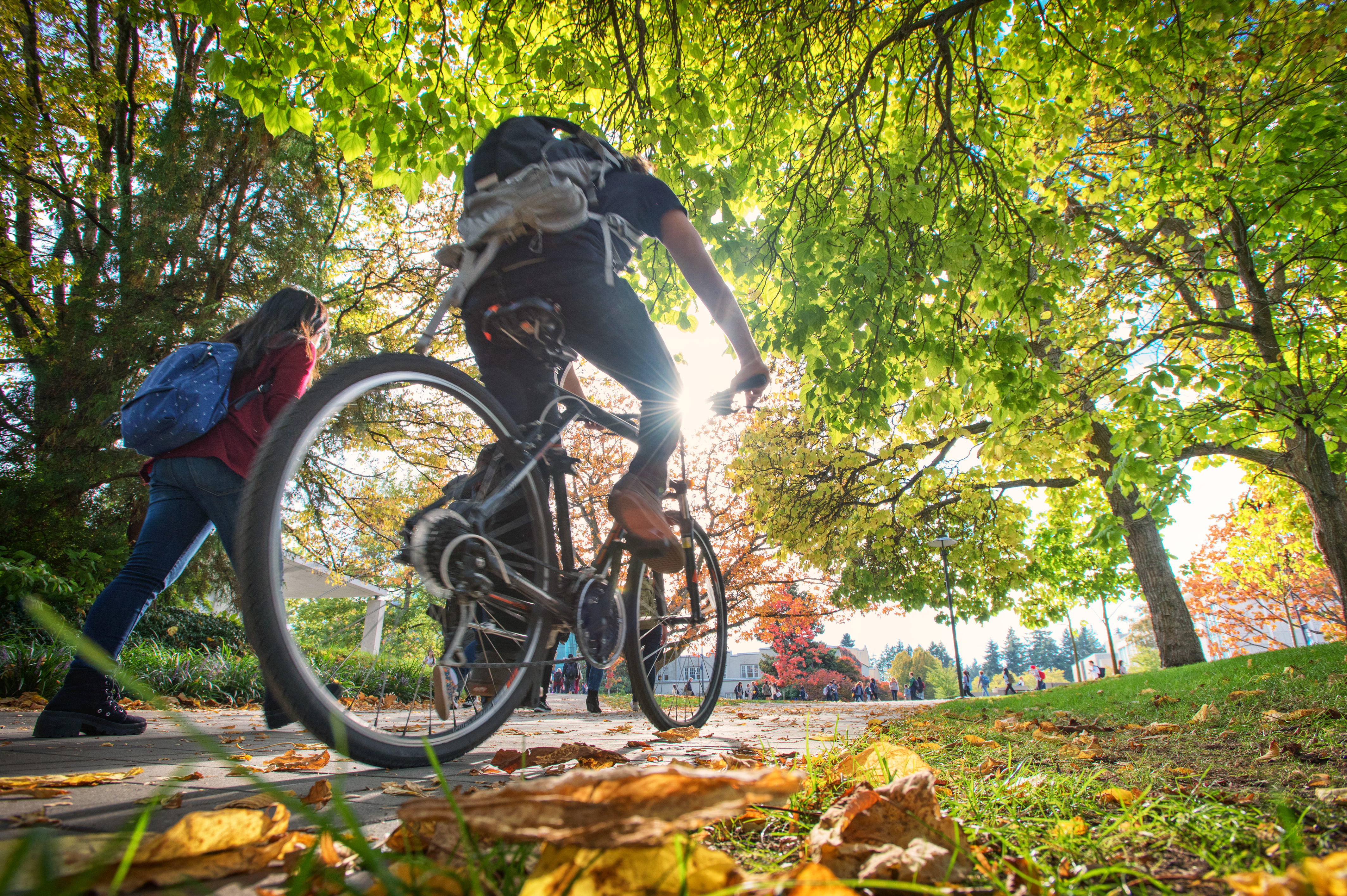
Built and Natural Environments
![]()
Active Transportation
Number of trips made by walking, cycling or transit
UBCO target in development.
2019-2020 Metrics
Measure
Trips made by walking, cycling or transit
UBC Vancouver
| % of trips currently made by walking, cycling, or transit. | 56% |
UBC Okanagan
| % of trips made by walking, cycling, or transit | TBD |
![]()
Complete Communities
Increase opportunities for people to learn, work, play, and live on our campuses through:
- An increase in the number of student beds to 17,300
- Increase in child care spaces to 1,200 by 2040.
2019-2020 Metrics
Measure
Number of student beds
UBC Vancouver
12,425 student beds
UBC Okanagan
1,680 student beds
Measure
Number of child care spaces
| Child care spaces (Vancouver) | 951 |
Built and Natural Environment Highlights
Advocacy for rapid transit
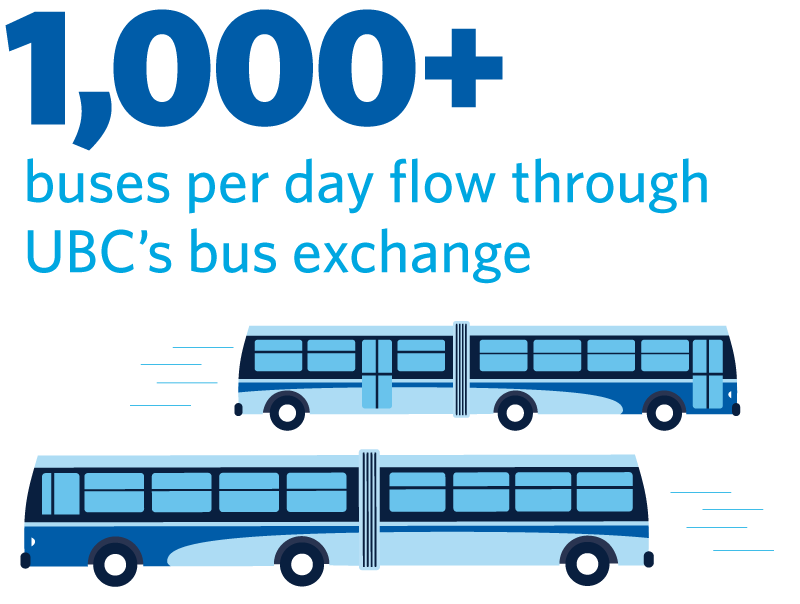
Every day, approximately 80,000 trips are made to and from UBC Vancouver via public transit, with over 1,000 buses along15 routes arriving on campus each day. Better connecting UBC to the rest of the Lower Mainland is a key to supporting regional prosperity and innovation, affordability and sustainability.
In November 2019, UBC joined with the City of Vancouver and the Musqueum, Squamish, and Tsleil-Watuth Development Corporation to sign a memorandum of understanding to advocate for rapid transit to UBC. This included a commitment to working collaboratively towards securing support and approvals to make this project happen.
UBC Okanagan promotes active transportation
UBC Okanagan challenged community members to step off the gas and commute using green modes of transportation during the National Campus Commuter Challenge.
During the course of the challenge, community members traveled 48,996 km by walking, rolling, carpooling, and taking public transportation. There was a 243% increase in commuting by carpool, 3,769 litres of fuel was saved, and 7,120 kg of CO2 was kept out of the atmosphere.
Smoke-free precincts implemented at UBC Vancouver
Creating a physical environment that supports health and wellbeing is key to activating the Okanagan Charter at UBC.
Led by Campus + Community Planning, UBC Wellbeing, and Vancouver Coastal Health, a number of departments and stakeholders, collaborated to implement smoke and vape-free areas in the "health precinct" (where UBC Hospital and many other health-discipline buildings are situated), and Library Garden, furthering UBC’s commitment to wellbeing of our people and places.
Bike share programs lower barriers to cycling on campus
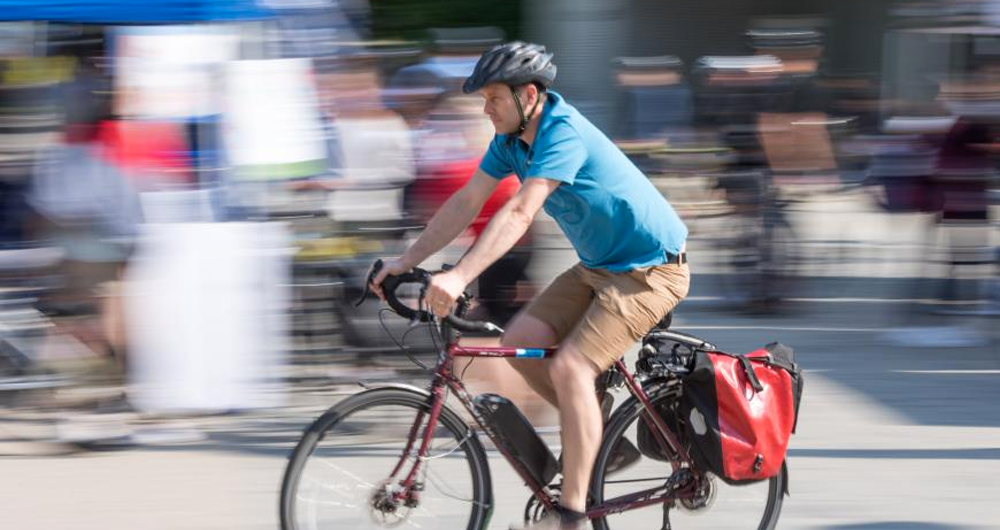
Campus + Community Planning is committed to making cycling a viable, accessible, and enjoyable way of commuting. Not only does cycling help reduce greenhouse gas emissions and support the Community Energy and Emissions Plan, but it also supports physical and mental wellbeing.
To make cycling more accessible, C+CP partnered with the HOPR bike-share program to bring over 200 bikes to campus. Have to rush between classes at MOA and Forestry? Need to get over to Wesbrook Village for a meeting? By signing up for a HOPR membership, community members can hop on a bike and head to their destination quickly and easily whenever they need to.
And for those not quite sure if they're ready to commit to riding on two wheels instead of four, C+CP piloted a "try an e-bike" program, which allowed faculty and staff to test drive electric bikes before buying.
Ready to make the switch and give cycling a go? Be sure to register your bike with Project 529, another C+CP partnership to help tackle bike theft on campus.
UBC pilots nano units on Vancouver campus
With over 12,000 student beds at on the Vancouver campus and over 1,600 on the Okanagan campus, UBC houses more students than any other Canadian university. But demand is high, especially for lower-cost alternatives in increasingly expensive cities.
In Fall 2019, 71 students moved into nano suites on the UBC Vancouver campus. At $700 per month, this lower-cost alternative in the new UBC Exchange Residence, allows students to have their own space, complete with a bathroom, kitchenette and convertible bed-desk—all creatively and comfortable contained in 140 square feet.
Built and Natural Environment Infographic
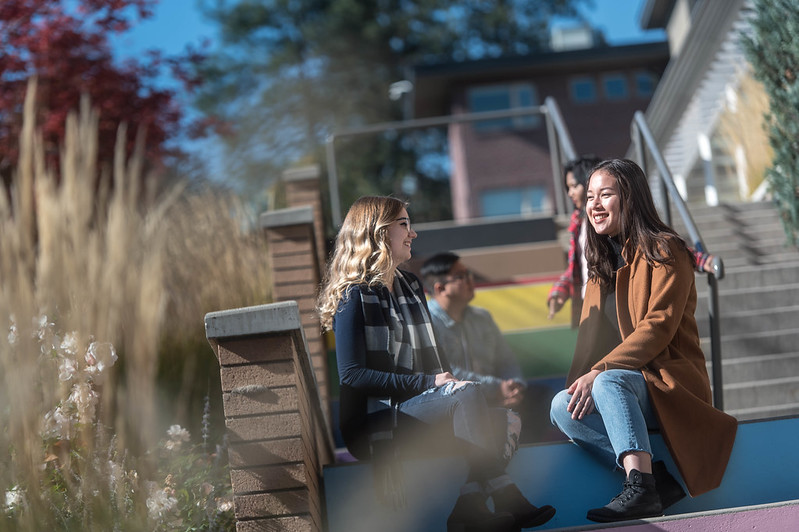
Social Connection
![]()
Feel Part of a Community
10% increase in UBC community members feeling part of a community by 2025.
2019-2020 Metrics
Measure
I have a group, community, or social circle at school where I feel I belong (feel at home, known connected to, support in my identity)*
UBC Vancouver
| Population | Data |
| Undergraduate Students | 57% |
| Graduate Students | 54% |
UBC Okanagan
| Population | Data |
| Undergraduate Students | 59% |
| Graduate Students | 62% |
Measure
% 1st year students that visit Collegia (Vancouver only) at least once a week
| Vancouver Collegia | 45% |
Measure
I feel that I am part of a community at UBC*
UBC Vancouver
| Population | Data |
| Staff and Faculty | 70% |
UBC Okanagan
| Population | Data |
| Staff and Faculty | 67% |
*% who strongly agree or agree
![]()
Inclusive Environment
10% increase in UBC community members reporting that their beliefs, identity and experiences are valued by 2025.
2019-2020 Metrics
Measure
My beliefs, identity, and experiences are valued at UBC*
UBC Vancouver
| Population | Data |
| Undergradute Students | 65% |
UBC Okanagan
| Population | Data |
| Undergraduate Students | 67% |
Measure
My diversity is valued in the workplace*
UBC Vancouver
| Population | Data |
| Staff and Faculty | 74% |
UBC Okanagan
| Population | Data |
| Staff and Faculty | 68% |
Measure
People treat each other with respect and consideration in my workplace*
UBC Vancouver
| Population | Data |
| Staff and Faculty | 77% |
UBC Okanagan
| Population | Data |
| Staff and Faculty | 69% |
*% who strongly agree or agree
Social Connection Highlights
Inclusion Action Plan approved by Board of Governors
After months of consultations and community engagement, the Inclusion Action Plan was presented to the Board of Governors and endorsed by the UBC Executive in December 2019.
Equity, diversity and inclusion are paramount to creating a campus environment where all faculty, staff and students feel welcomed, supported, and connected. UBC has long been committed to championing this type of environment for years, but there is more that we can do and more that our community wants to see. The Inclusion Action Plan represents UBC's commitment to building a better campus for all.
UBC Celebrates 5th Annual Harvest Feastival
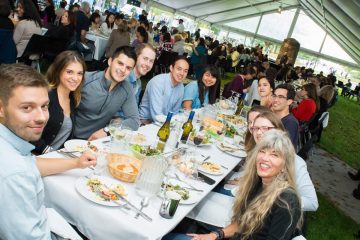
Over 800 faculty, staff, students and community members joined together to celebrate the 6th annual Harvest Feastival.
The annual long-table dinner has quickly become a cherished campus tradition and a much-anticipated way to bring the community together to celebrate a night of food, friends, and arts and culture. Chefs from UBC Food Services prepared an incredible three-course dinner, while talents like UBC Opera students, the Thunderbird Marching Band, and more kept guests entertained between bites.
After dinner, guests enjoyed access to a range of arts and culture programming— from improv shows, to exhibits at MOA, to interactive displays at the Belkin Art Gallery, and more.
Led by C+CP's Community Development unit, Harvest Feastival brings together numerous campus units under a common goal of building a supportive, more connected campus community by bringing people together.
IBPOC Connections holds space for collaborations and conversations
IBPOC Connections is an initiative designed for and by faculty and staff who identify as Indigenous, Black, and People of Colour at UBC – the traditional, ancestral and unceded territory of the xʷməθkʷəy̓əm (Musqueam) people.
Since it was established in December 2019, IBPOC Connections has brought together over 600 faculty and staff to come together to be in good company, to converse and to collaborate. As a convening space, IBPOC Connections is about community, belonging, and engagement, and aims to enhance the experiences and outcomes of IBPOC faculty and staff through a focus on community building, leadership and capacity building.
Graduate Student Wellbeing Ambassador Program launched
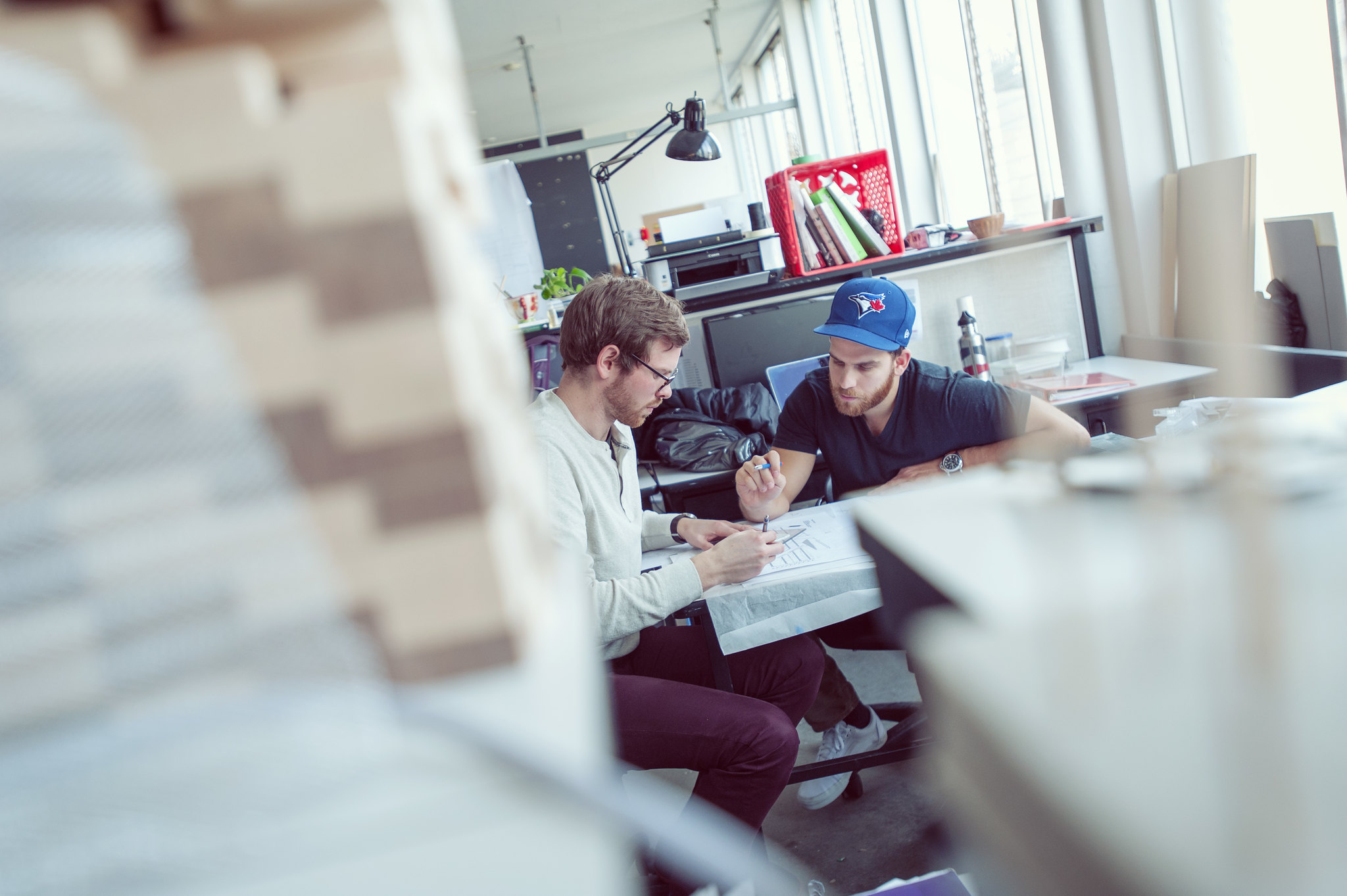
Graduate school can be an exciting and challenging time. Some students may experience wellbeing challenges, including managing stress, navigating support, finding time for self-care, and balancing personal and academic responsibilities. Research shows that peer support can be an important tool in helping students thrive academically, socially and emotionally—that’s where the Graduate Student Wellbeing Ambassador program comes in!
Developed by Health Promotion and Education, and supported through UBC Wellbeing Strategic Initiatives Funds, the GSWA is a great example of how UBC's community members are our greatest asset in achieving our vision to be a health and wellbeing promoting institution.
In its pilot year, 24 graduate students across 20 departments participated, in the Graduate Wellbeing Ambassador Program, helping to build capacity, build connections, and share knowledge and supports to enhance graduate student wellbeing.
Staff and Faculty Sports Day at UBC Okanagan
With costumes, games, and opportunities to re-live your elementary school glory days, Staff and Faculty Sports Day is a highlight for many faculty and staff at UBC. The annual competition gives staff and faculty the chance to meet colleagues from different departments, while engaging in a bit of friendly competition through activities and events reminiscent of beloved childhood games.
This year, UBC Okanagan saw its highest-ever participation rates in Staff and Faculty Sports Day, and kept the opportunities for informal connection going with a food truck festival event afterwards.
Indigenous Student Collegium established in the First Nations Longhouse
“Indigenous safe spaces are grounding and healing, especially in an institutional environment” says Indigenous Student Collegium member Corrina Sparrow.
Collegia are meant as a community-building "home away from home" for students, and the new Indigenous Student Collegia in the First Nations House of Learning is no exception. Staffed by a team of student advisors, the ISC is a welcoming and supportive space for both graduate and undergraduate Indigenous students.
Created in collaboration between the First Nations House of Learning and the UBC Collegia program, the Indigenous Student Collegium, provides opportunities for First Nations, Métis, and Inuit students on UBC’s Vancouver campus to study, meet one another, connect with elders, or take part in cultural practices.
Annual Report Infographic

Full Annual Report Infographic
Wellbeing Annual Report Data Collection
In developing the Wellbeing Strategic Framework, a number of stakeholders were consulted to determine targets and indicators. In this first year of reporting, we continue to develop baselines and the measures throughout are presented from data that is currently available. These measures are intended to give a snapshot of our campuses and do not yet track changes towards each target. We look forward to continuing our collaborative work around data collection and to working across units and departments to advance the targets.
The UBC Wellbeing Annual Report relies on data from a variety of sources, such as the Undergraduate Experience Survey, (for current undergraduate student data presented), the Workplace Experience Survey, and the Canadian Campus Wellbeing Survey. Additionally, data is used from various partners, such as Student Housing and Community Services, Campus and Community Planning, and UBC HR.
To focus action, the Wellbeing Strategic Framework identified targets and indicators that support our understanding of impact and change. In an institution like UBC, complexity of population-based data cannot be underestimated. Aligning measures across populations and coordinating survey instruments remains a challenge demonstrated by data gaps as well as the current lack of baseline data and targets for some priority areas.
UBC Wellbeing is working with partners to address these challenges and align measures. A significant opportunity is further utilization of the Canadian Campus Wellbeing Survey (CCWS), which has just provided the first food insecurity prevalence data for graduate students and could be adapted for use with faculty and staff.
We will update as baselines are established, so be sure to check back!
Working Together
These are just a few of the many examples of policies, programs, plans and initiatives that UBC departments, units, and community members have undertaken over the past year to activate the Wellbeing Strategic Framework and help UBC towards our vision of becoming a health and wellbeing promoting institution.
So how will you embed wellbeing into your workplace, learning environment, or organization? And how can we help?
We all have a hand in shaping campus environments that support health, wellbeing, and sustainability. By championing wellbeing, together we can build stronger, healthier, and more inclusive communities at UBC and beyond.
